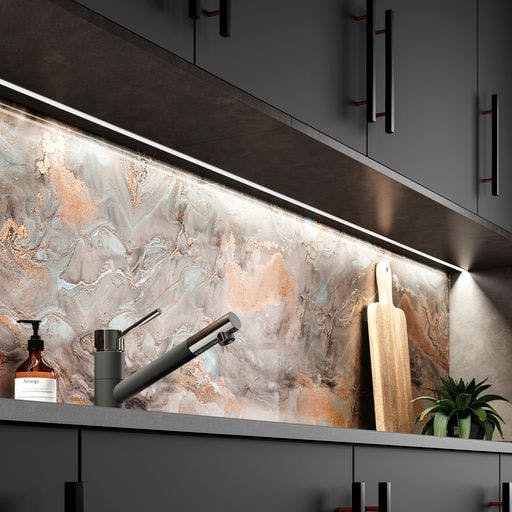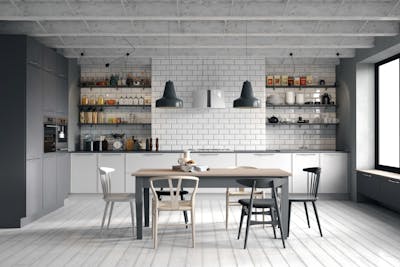How much does a kitchen renovation cost?
Published: 12 April 2024
Renovating a kitchen is an exciting activity, but it's crucial to approach it with careful consideration of your financial resources and priorities. By understanding the key cost factors and implementing strategic budgeting techniques, you can achieve the kitchen of your dreams without breaking the bank.
In this blog, we will explore the various factors that influence the cost of renovating a kitchen, and help you plan and budget effectively for your new and spacious kitchen.

How far can your budget go?
To begin, let's clarify key budgetary terms. Renovation cost encompasses the total expenditure involved in transforming a kitchen, including both material and labour expenses. Material cost refers specifically to the price of components such as worktops and cabinets, while labour cost pertains to the fees associated with skilled professionals executing the renovation.
When it comes to budget range, it's essential to consider the scale of the renovation. Cosmetic upgrades typically require a more modest investment, while mid-range renovations involve a more substantial budget. It's crucial for homeowners to set realistic expectations and understand that individual choices will impact the final cost.

Julie Gokce, Senior Designer at More Kitchens said:
"Embarking on a kitchen renovation journey is undoubtedly thrilling, yet it can also be daunting if you're unaware of the hidden expenses lurking beneath the surface.
The cost of renovating your kitchen depends on how much change you're aiming for. However, don't forget to factor in additional expenses such as replastering, redecoring, and potentially relocating services when planning your budget."
How much does a kitchen renovation cost?
At More Kitchens, our average kitchen costs typically amount to £20,000. However, if you're looking to invest in transforming your kitchen into a luxurious space, the possibilities are limitless. Our experienced designers suggest budgeting around £40,000 for such projects, encompassing extensive renovations like structural changes, open-plan designs, and more.
To provide a clearer understanding of the cost variations, here's a breakdown:
| Cost Considerations | Basic Kitchen | Average Kitchen (£20,000) | Luxury Kitchen (£40,000+) |
| Material and Labour Costs | Included | Included | Included |
| Additional Features / Upgrades | Limited | Moderate | Extensive |
| Building Work | Minimal | Minimal to moderate | Extensive |
| Structural Changes | None | None to moderate | Extensive |
| Open Plan Design | Not included | Not included | Included |
| Moving Internal Walls | Not included | Not included | Included |
| Total | £15,000 | £20,000 | £40,000+ |
As you can see, our services cater to a range of budgets, with options available for basic, average, and luxury kitchen renovations. We pride ourselves on delivering exceptional quality and craftsmanship tailored to our clients' needs across all price points.Several key factors can influence the cost of a kitchen renovation. The size and layout of the kitchen play a significant role, with larger and more complex spaces typically requiring higher expenditures.
Other costs to consider are:
> Materials
Materials include options such as quartz, granite, and laminate for worktops, with prices typically ranging from £200 to £500 per square metre for quartz, £300 to £700 per square metre for granite, and £20 to £100 per square metre for laminate.
> Custom cabinets
They can range from £500 to £1,500 per linear metre, semi-custom cabinets from £300 to £800 per linear metre, and stock cabinets from £100 to £400 per linear metre.
> Appliances
From luxury to standard or budget, the appliance market offers a plethora of options. High-end appliances like refrigerators, ovens, and dishwashers can range from £1,000 to £5,000 each. Mid-range alternatives fall between £500 to £2,000, while budget-friendly options can be snagged for under £500 each. Moreover, the market has witnessed a surge in smart appliances, including intelligent refrigerators, ovens, and dishwashers. Explore more about smart appliances.

> Demolition and plumbing costs
Demolition and plumbing costs can vary depending on the extent of the renovation and any necessary changes to existing fixtures. Labour costs are influenced by factors such as contractor expertise, location, and the complexity of the project, typically ranging from £1,000 to £5,000 for demolition and plumbing, and £2,000 to £10,000 for general labour.
> Permits and inspections
Obtaining necessary approvals incurs fees ranging from £100 to £500.
If you’re opting for a more basic kitchen renovation, you can still make a significant impact by playing with colours and accessories. Introducing vibrant hues through splashbacks, wall paint, and smaller accessories like bar stools, wall clocks, and fruit bowls can infuse personality into the space, with costs varying from £50 to £500 for accessories and paint.
Consider embracing an eclectic style by incorporating brightly coloured vessels or open shelves to showcase your crockery collection, with costs ranging from £100 to £1,000 for shelving and decorative items.
Alternatively, for a more streamlined look, opt for a modern-contemporary style, or embrace the warmth of a rustic aesthetic characterised by natural wood and vintage cabinets, with costs varying depending on materials and finishes chosen. If you're feeling nostalgic, you could even explore a retro kitchen design, with costs ranging from £500 to £5,000 depending on the extent of the retro features incorporated.
Think countertops and splashback
For budget-friendly countertop surfaces in UK kitchens, laminate remains the most common and economical choice. With a wide range of colours and styles available, laminate has evolved significantly in recent years. Starting at approximately £100 per square metre, it offers practicality and durability at an affordable price point.
Alternatively, bamboo or stainless steel countertops are intriguing options, though slightly more expensive, starting at around £170 per square metre. Bamboo adds a warm, wooden tone to your kitchen, while stainless steel provides a sleek and modern aesthetic, known for its hygienic and easy-to-clean properties. For those with a bit more flexibility in their budget, laminated timber countertops are worth considering, starting at around £255 per square metre.
As for splashbacks, ceramic tiles are a cost-effective option that won't break the bank. You can choose from neutral, plain styles or explore different colours and patterns to suit your taste. If you're on a tight budget or prefer more luxurious materials such as mosaics or glass, consider covering only the area directly above and next to the cooktop. Another option is to install a longer but lower strip of splashback material, complemented by painting the rest of the wall with a high-quality, antibacterial paint specifically designed for kitchens.

Additional considerations:
While envisioning stunning countertops and sleek appliances is exciting, a successful kitchen renovation goes beyond aesthetics. Here are key factors to consider before embarking on this transformative journey:
1. Smart home integration:
While smart kitchen features offer convenience and automation, it's crucial to weigh the cost against long-term value. Popular features range from budget-friendly smart plugs to high-end appliances, each with varying price points. Consider your usage habits and desired level of automation before investing.
2. Sustainable elements:
Eco-friendly materials like recycled countertops or bamboo cabinets can contribute to a greener kitchen and potentially offer cost benefits compared to traditional options. Explore available options and research their environmental impact and potential cost savings.
3. Unexpected costs:
Renovation projects often encounter unforeseen circumstances, leading to cost overruns. It's prudent to establish a contingency fund to cover potential issues like material price fluctuations, permit delays, or hidden structural problems.
4. Renovation timeline:
The duration of your renovation depends on its scale. Smaller projects like painting may be completed within a weekend, while extensive renovations involving demolition and construction can take several months. Be aware of typical timelines for different project sizes and factors that can impact them, such as material lead times or permit approvals.
By carefully considering these additional aspects, you can make informed decisions, manage your budget effectively, and ensure a smooth and successful kitchen renovation.
.PNG?auto=compress%2Cformat&cs=strip&ixlib=php-1.1.0&s=351cf65239ad2eb8445075484203fca3)
Cost-saving strategies
Crafting your dream kitchen requires meticulous planning, and financial considerations play a crucial role in transforming vision into reality. By employing strategic cost-saving measures, you can navigate the budget landscape effectively and achieve your desired outcome without compromising on quality.
> Prioritising needs over wants:
The first step lies in differentiating between essential elements and desirable extras. Identify the "must-have" features that will truly enhance your kitchen's functionality and value, and distinguish them from the "nice-to-haves" that may add a touch of luxury but aren't essential for core functionality.
> Comparative analysis:
Seeking competitive quotes from various contractors and material suppliers is paramount. Don't hesitate to solicit estimates from multiple sources to ensure you're receiving the most favourable value proposition. Remember, comparing quotes can potentially save you thousands on your project.
> Exploring financing avenues:
If financing your renovation is necessary, thoroughly research available loan options and carefully weigh the pros and cons of each. Consider factors like interest rates, repayment terms, and potential hidden fees to ensure you make an informed decision that aligns with your financial goals and budget constraints.
> Planning & budgeting: Key to success:
If you’re thinking of renovating your kitchen, it’s crucial to start planning and budgeting thoroughly before throughout the renovation process. Staying proactive and adhering to your financial roadmap will minimise the risk of unexpected costs and ensure your project stays on track.
> Seek expert guidance:
Seek professional advice from qualified kitchen renovation specialists.Here at More Kitchens we can provide personalised estimates, guide you through cost-saving strategies specific to your project, and ensure your budget remains realistic and achievable.
> Call to action:
Schedule a free consultation with us to discuss your specific needs and budget, or visit our website for further information and resources.
By incorporating these essential strategies and leveraging expert guidance, you can approach your kitchen renovation with confidence, ensuring your dream kitchen becomes a beautiful and financially sound reality.
Follow-up FAQs for your kitchen renovation cost blog:
1. How much should I budget for unexpected costs?
It's wise to allocate 10-20% of your total budget for unforeseen expenses. This could cover hidden structural issues, material price fluctuations, or permit delays.
2. Is it worth splurging on certain materials, like countertops ?
Prioritise durability and functionality for frequently used items like countertops. Consider splurging on features that significantly enhance your daily life, like a high-end oven you'll use often.
3. What are some red flags to watch for when choosing a contractor?
Unrealistic estimates, lack of certifications or insurance, poor communication, and negative online reviews are all potential red flags.
4. Can I save money by financing my renovation?
Financing can help manage upfront costs, but be mindful of interest rates and choose a repayment plan that fits your budget. Explore different options like personal loans, home equity lines of credit, or contractor financing.
Share this Post






.PNG?auto=compress%2Cformat&cs=strip&ixlib=php-1.1.0&s=351cf65239ad2eb8445075484203fca3)
















